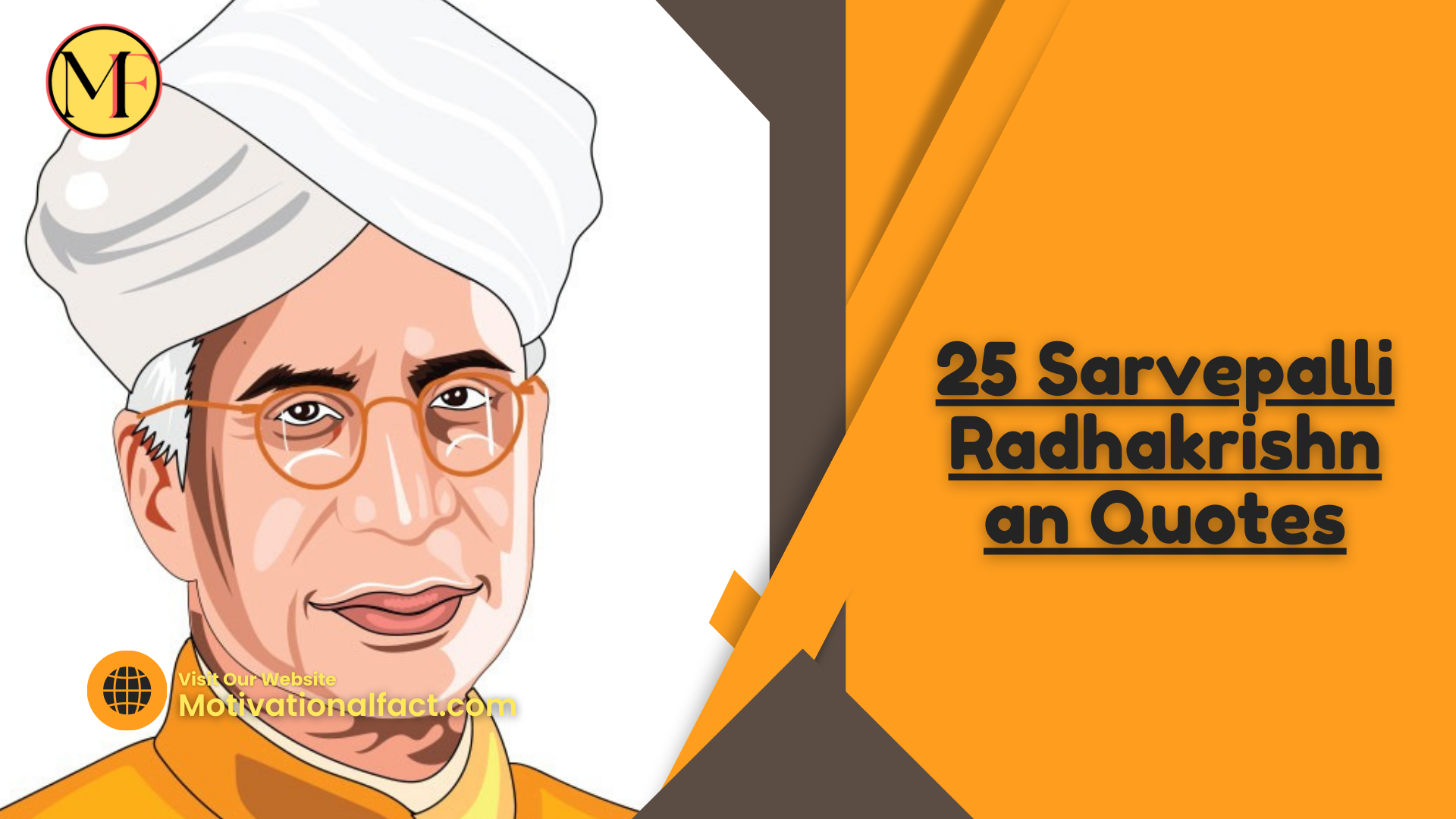In the illustrious pantheon of modern India’s visionary thinkers, scholars and leaders, few figures tower as prominently as Dr Sarvepalli Radhakrishnan – philosopher, educator and public intellectual par excellence. Over an exemplary six-decade career, Radhakrishnan made seminal contributions spanning fertilizing young minds as an inspirational teacher, crafting the blueprint for a world-class university ecosystem, steering the newly independent nation as statesman, and acting as a cultural ambassador disseminating ancient Indian wisdom to global audiences.
Driven by an unquenchable inner flame kindling inquiry, Radhakrishnan left an indelible mark across domains. His incisive interpretations of Hinduism and Indian idealist traditions for contemporary times acted as conduits for intercultural exchange. Furthermore, Radhakrishnan’s ability to synthesize eastern intuitiveness with western logic furnished invaluable pathways towards grasping perennial truths underpinning divergent schools of thought. As exemplar and guide, Radhakrishnan illuminated the timeless relevance of India’s rich philosophical heritage interwoven into everyday living. This article chronicles his monumental life’s work shaping mentalities.
Early Life, Education and Philosophical Pursuits
Sarvepalli Radhakrishnan was born into a middle class Brahmin family in Tiruttani, Tamil Nadu state on September 5, 1888. Exposure to Hindu mythology and epics from early childhood activated a lifelong passion for plumbing scriptural wisdom, absolute ideals situated beyond perceptual reality’s ephemeral appearances. After schooling in Tirupati, then Chennai college (graduating masterfully in Philosophy), an outsourcing job financed Radhakrishnan’s MA studies at Madras Presidency College where induction into Vedanta philosophy’s non-dualistic interpretation transformed worldviews.
Doctoral research under idealist thinker Professor Ashutosh Mookerjee further expanded scope, strengthened identification with heritage and initiated probing of western parallels. Then between academic stints teaching Hinduism and serving as Philosophy Chair at Mysore and Calcutta Universities respectively, an invitation to lecture on Hindu thought at Oxford University in 1926 and 1929 brought Radhakrishnan global recognition as a leading exponent of India’s intellectual promise.
A 1932 appointment as Spalding Professorship at Oxford enabling deeper examination of theoretic connections between western idealism and subcontinental perspectives preceded transfer to an equivalent plum post at Oxford’s rival, Cambridge University for the 1933 term. Thereafter, as Professor of Eastern Religions chair at Oxford from 1936-1952, Radhakrishnan produced his seminal two volume treatise outlining an Eastern vision integrating science and spirituality – a tour de force declaring India’s resurgence. By inhabiting the sanctum of British academia, this eastern interlocutor thus organically disseminated insights on India’s progressive worldview through a global megaphone.
Academic Excellence and Educational Reforms
In between steering initiatives upgrading India’s higher education architecture to elevate standards matching international benchmarks, Radhakrishnan prolifically authored books and essays conveying the essence of Hinduism to western intelligentsia as a scientific spiritual system focused on experiential unity between microcosmic consciousness with transcendent macrocosmic reality.
Central to his numerous academic contributions was role as free India’s first Chairperson of the University Grants Committee constituted in 1945. Visualizing transformed learning spaces guiding the young nation’s modernization needs, Radhakrishnan systematized centralized assistance across affiliated universities prioritizing disciplines catering socioeconomic priorities alongside driving excellence through meritocratic fellowships grooming future faculty. Educational administration tenures as Vice Chancellor of Andhra plus Benaras Hindu University and diplomatic stint representing India in Russia and UNESCO supplemented deeper insights benefiting recommendations promoting a well-rounded curriculum.
Radhakrishnan also assisted co-founding India’s premiere social science research establishment, the Indian Council of Social Science Research in 1951. Furthermore, the Radhakrishnan Committee Report provided guidelines for restructuring university education. Thereby via creating institutional frameworks and elevating pedagogic quality for nurturing exemplary governance and citizenship necessary in a postcolonial resurgent India, Radhakrishnan indelibly shaped the country’s knowledge blueprint empowering millions to excel.
Political and Diplomatic Contributions
Apart from guiding India’s education architecture even while continuing philosophical authorship, Radhakrishnan readily accepted requests to represent the promising young republic as cultured ambassador in political and diplomatic theatres post-Independence.
Between 1947-1949, Radhakrishnan’s astute leadership as India’s first Ambassador to the Soviet Union skillfully navigated diplomatic challenges accompanying Partition plus averted potential ideological collisions. Using personal rapport with Stalin cultivated since visiting Moscow in 1956, Radhakrishnan secured food aid addressing acute scarcity while tactfully declining military assistance proposals. Furthermore, Nehru appointed him leader of Indian delegations to UNESCO and US.
Thereafter Dr. Radhakrishnan lent administrative acumen by serving as the nation’s first Vice President from 1952-1962 before being unanimously nominated non-politically India’s second President from 1962-1967 following death of incumbent Dr. Rajendra Prasad. As largely ceremonial Head of State, the erudite Radhakrishnan hosted dignitaries like John F Kennedy and Queen Elizabeth II using opportunities for cultural exchange predating today’s soft power outreach. Thereby demonstrating consummate skill marshaling external relations, domestic development and fostering unity as newly sovereign India found its footing, Radhakrishnan offered visionary leadership during a critical modernizing transition.
Philosophical Legacy and Contributions to Interfaith Understanding
Yet it is arguably for eloquently elucidating the legitimately universal essence of Indian philosophical insights that Sarvepalli Radhakrishnan’s legacy gleams brightest as evidenced by a still unrelenting global rediscovery of subcontinental wisdom. By coherently explicating significance of Advaita Vedanta via commentaries on principal scriptures like Bhagvad Gita and Upanishads aimed at Western skepticism, Radhakrishnan bridged intellectual chasms by demonstrating empirical validity underlying Indic spiritual traditions often misperceived as mystical poetry.
Central to his exegesis were expositions affirming the possibility of transcendent experience unifying subjective beings with omnipresent consciousness or Brahman through practices like yoga, thereby providing pathways for attaining enlightened perspective. By drawing parallels to philosophical idealism, Radhakrishnan framed India’s spiritual canopy as “scientific religion” organically aligned with universal reason and empiricism rather than contradictory to modern rationality. Thereby he convincingly positioned Hinduism’s conceptual sophistication on par with predominant Western intellectual currents for an intercultural audience.
Radhakrishnan’s interpretations unpacked intrinsic emphasis on religious tolerance within Hinduism captured by its axiomatic pluralism: “Truth is One, Paths are Many”. Contrasting exclusionary claims elsewhere, Radhakrishnan highlighted Hinduism’s assimilation of divergent approaches towards the infinite divine as emblematic of India’s cultural ethos comfortable with open-ended seeking. Such logical yet welcoming expositions played a monumental role in removing misconceptions about Hinduism among western intelligentsia dominated by a Abrahamic lens besides sowing early seeds for global yoga popularity.
Recognition and Honors
In honor of Dr Sarvepalli Radhakrishnan’s momentous contributions as educator, president and peacemaking public sage transmitting India’s humanistic philosophical heritage abroad, the Indian Government fittingly declared the anniversary of his birth on September 5th ‘Teachers Day’ from 1962 onwards. Furthermore, beyond a Bharat Ratna bestowment in 1954 followed by British knighthood in 1963, Radhakrishnan was feted through 15 honorary doctorates collected along professorial journeys in reputed global universities like Glasgow, Moscow and Uppsala.
Capping these recognitions of a lifetime spreading India’s pluralistic worldview came the Templeton Prize for Progress in Religion in 1975 awarded to Radhakrishnan two years before passing at age 89. By propelling eastern perspectives into western consciousness thus paving pathways for their harmonious coexistence, Radhakrishnan furthered humanity’s comprehension of truth – the apotheosis of ethical living. Thereby in exemplifying and explicating Indic insight’s utmost universal kernel devoted to all-connecting welfare, the remarkable journey of this teacher truly made Radhakrishnanji both sage and wayshower for ages to come.
Conclusion: A Beacon of Intellectual and Spiritual Light
Over the course of six prolific decades via an outstanding career spanning structured education, politics and diplomacy alongside prolifically authoring definitive treatises disseminating Indic thought, Dr Sarvepalli Radhakrishnan established himself as free India’s consummate philosopher-statesman. By opening engagements between civilizational worldviews, upgrading academic standards at home and steering policies for the fledgeling nation while remaining organically anchored in his spiritual roots, Radhakrishnan shone as a contemporary exemplar of the timeless Indian ideal balancing inner wisdom with outer action.
From early life immersed in scriptural study germinating a brilliant scholarly corpus explicating Hinduism’s essence and history for world intelligentsia, Radhakrishnan bridged philosophical streams while driving political change to create an ecosystem facilitating India’s cultural and economic resurgence. Thereby in mirroring the pluralistic acceptance, reasoned flexibility and progressivist desire characterizing India’s civilizational ethos at its finest, this versatile titan became both exemplar and custodian for one of humanity’s greatest intellectual traditions – lighting the path ahead through indelible wisdom and lasting writings. Truly, the manifold gifts bequeathed by India’s beloved teacher continue benefiting posterity, reminding all that meaningful living entails sharing knowledge’s glittering torch lighting humankind’s onward march.
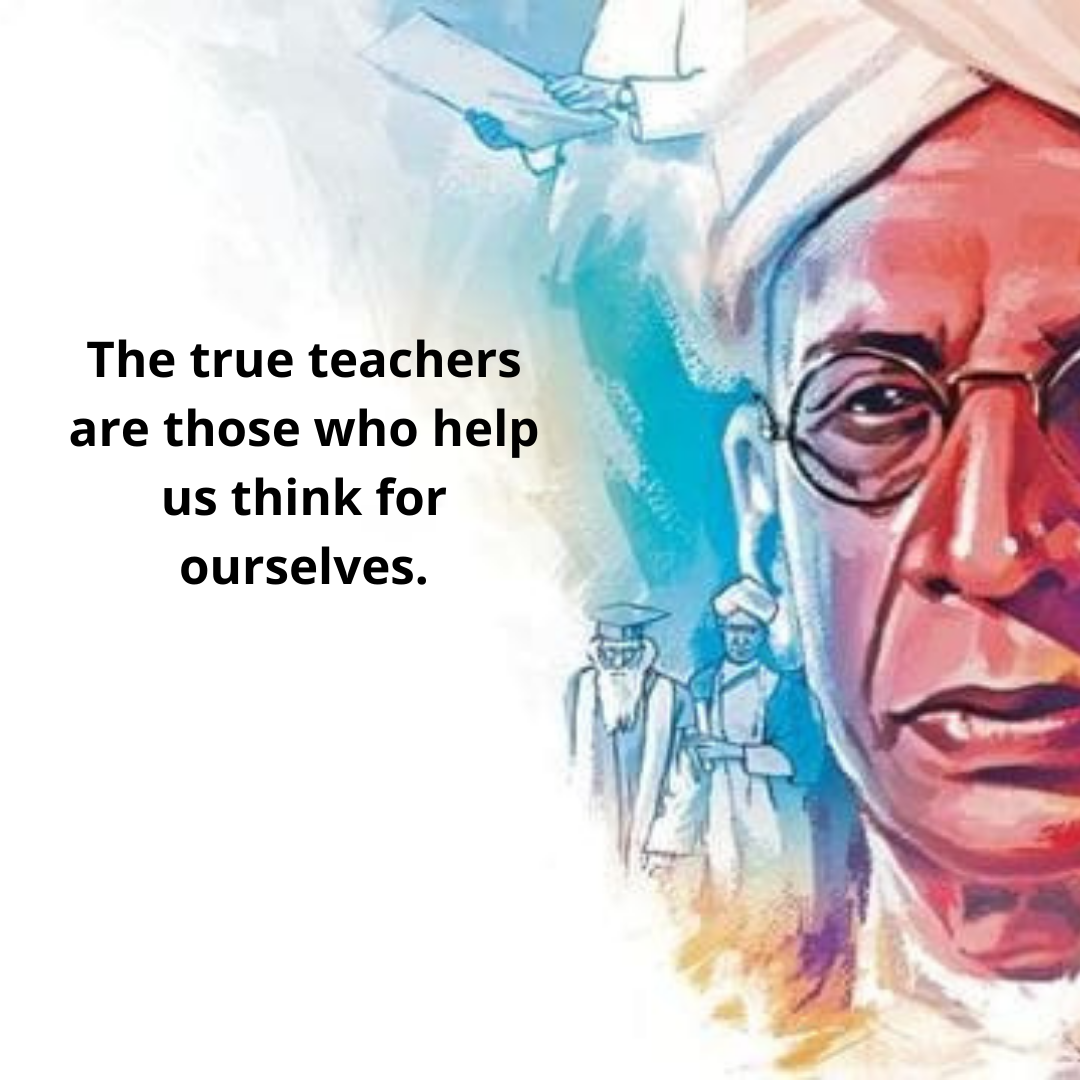
The true teachers are those who help us think for ourselves.
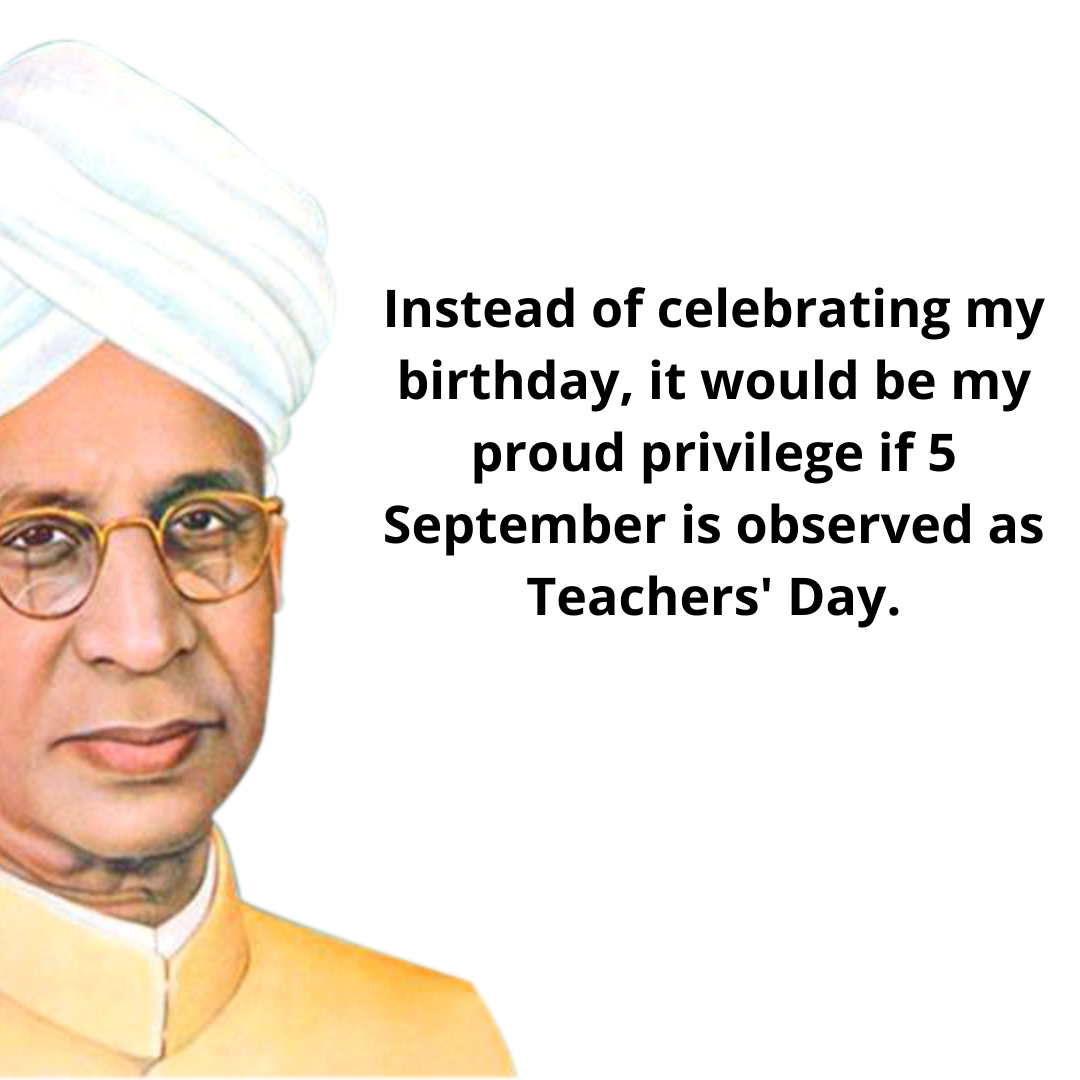
Instead of celebrating my birthday, it would be my proud privilege if 5 September is observed as Teachers’ Day.

Religion is behavior and not mere belief.
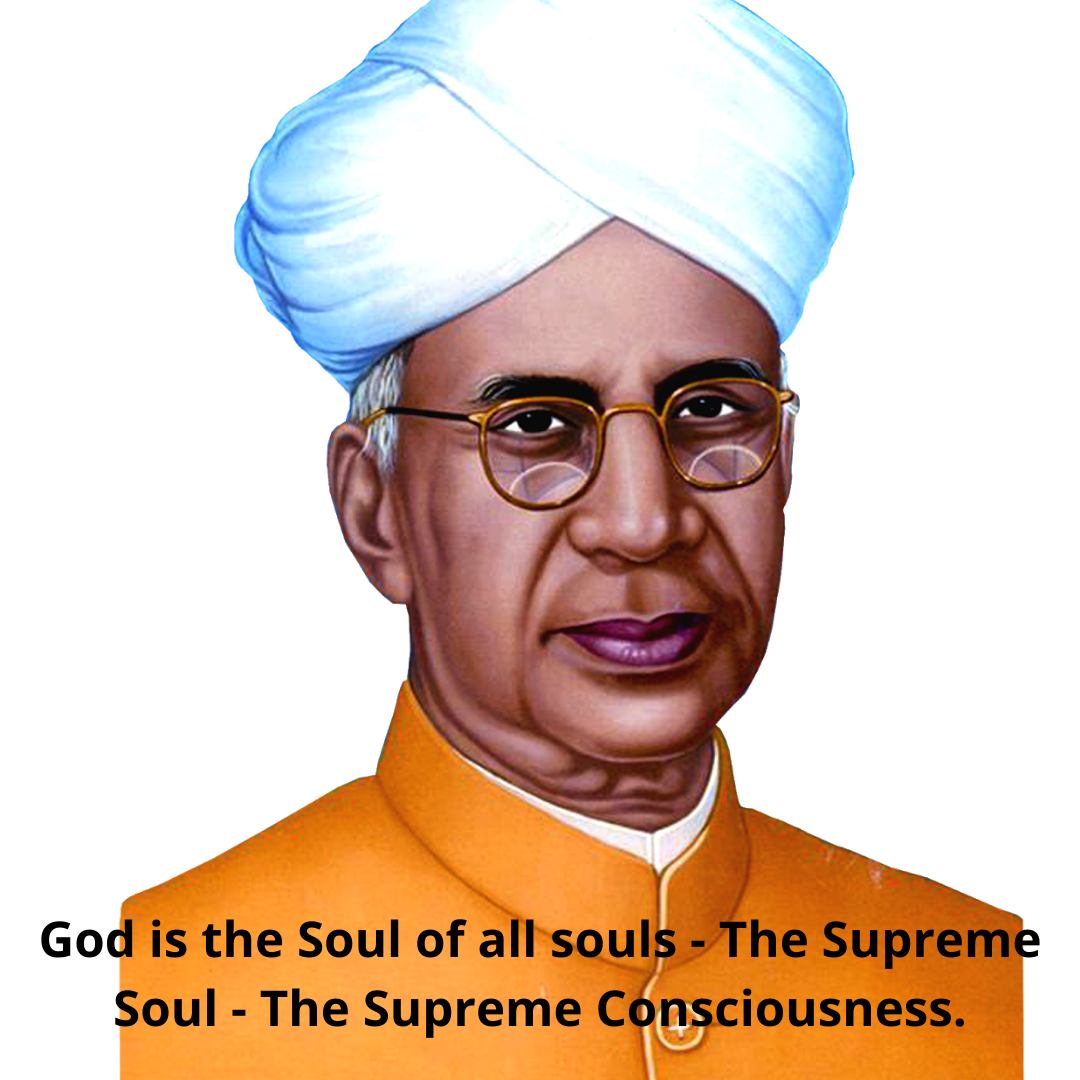
God is the Soul of all souls – The Supreme Soul – The Supreme Consciousness.
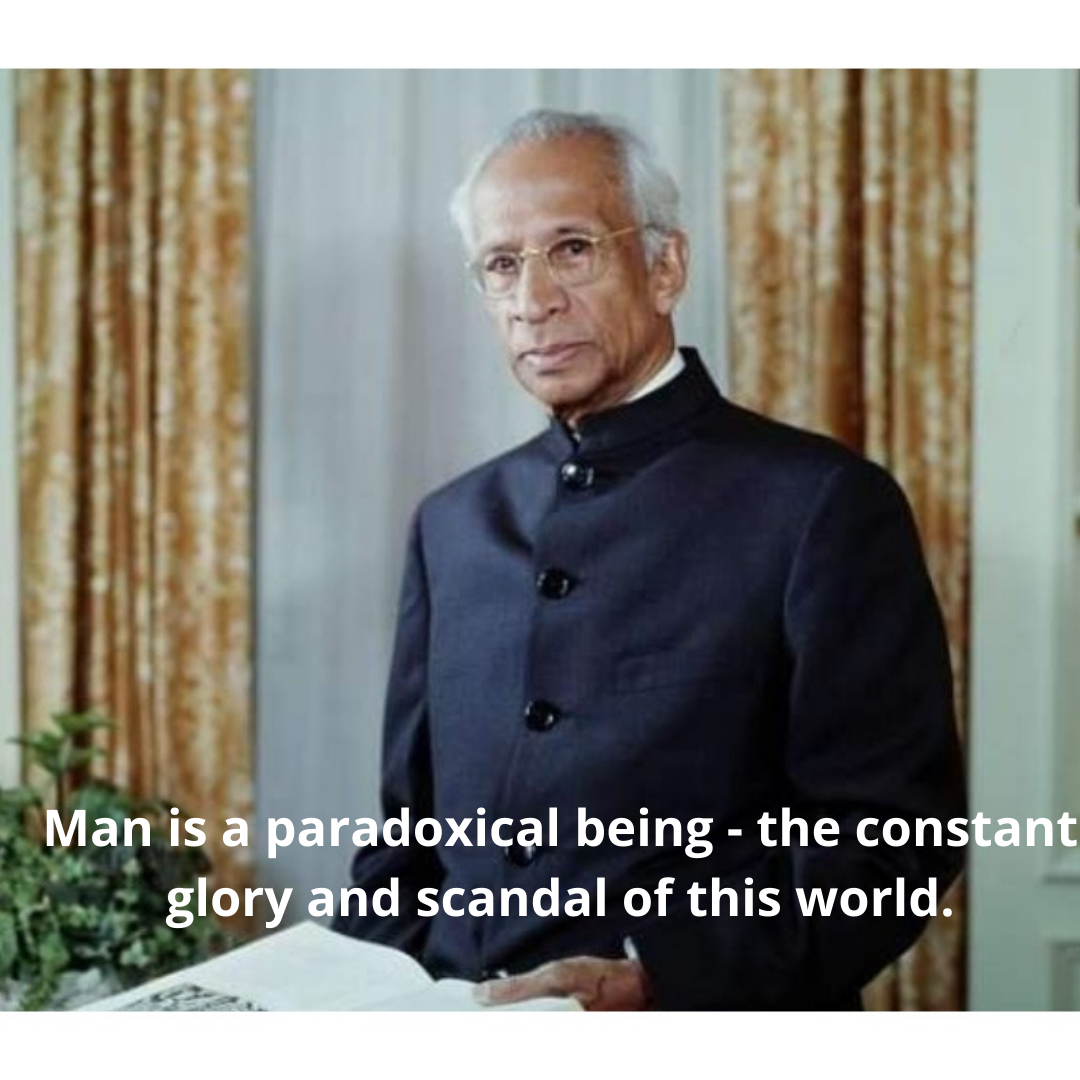
Man is a paradoxical being – the constant glory and scandal of this world.
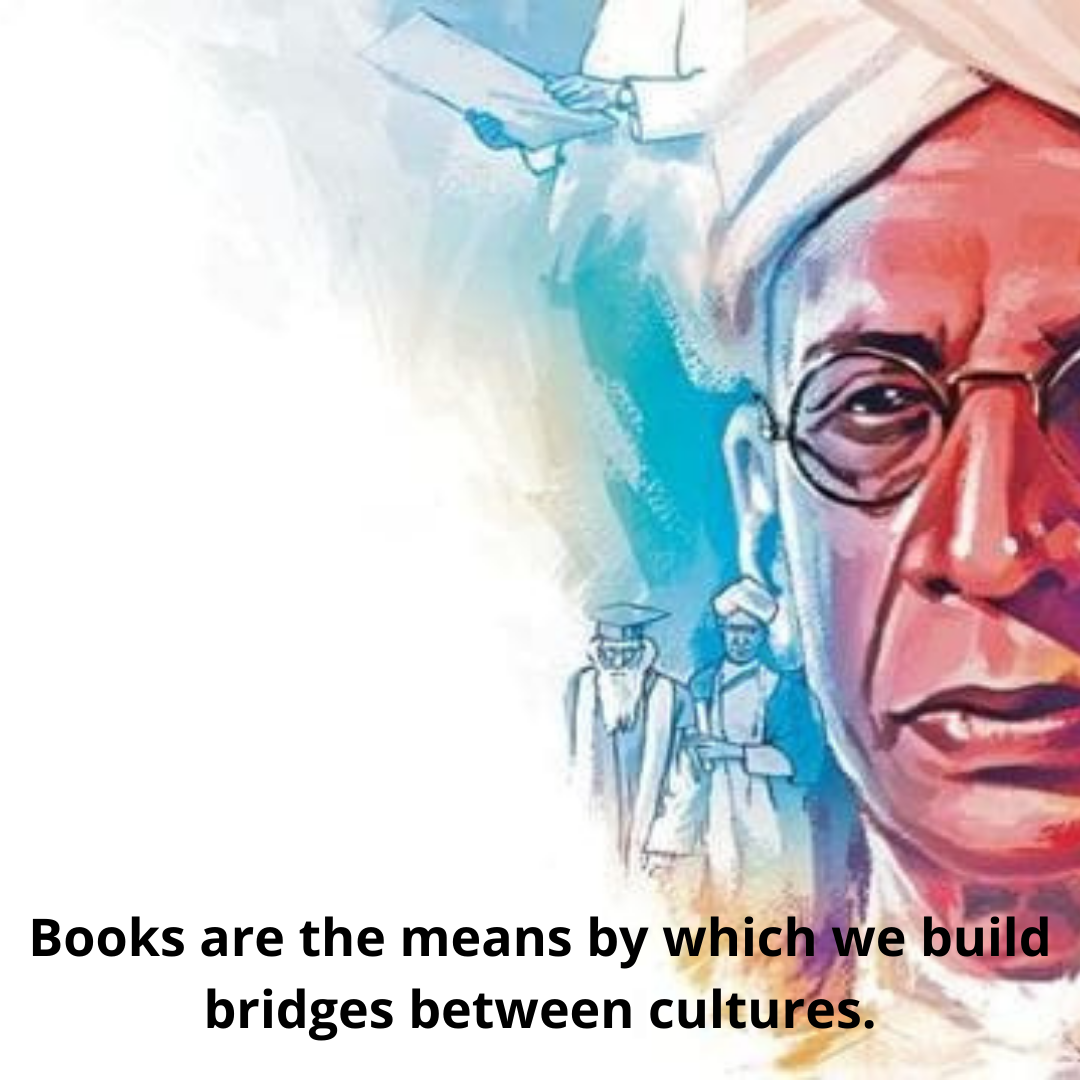
Books are the means by which we build bridges between cultures.
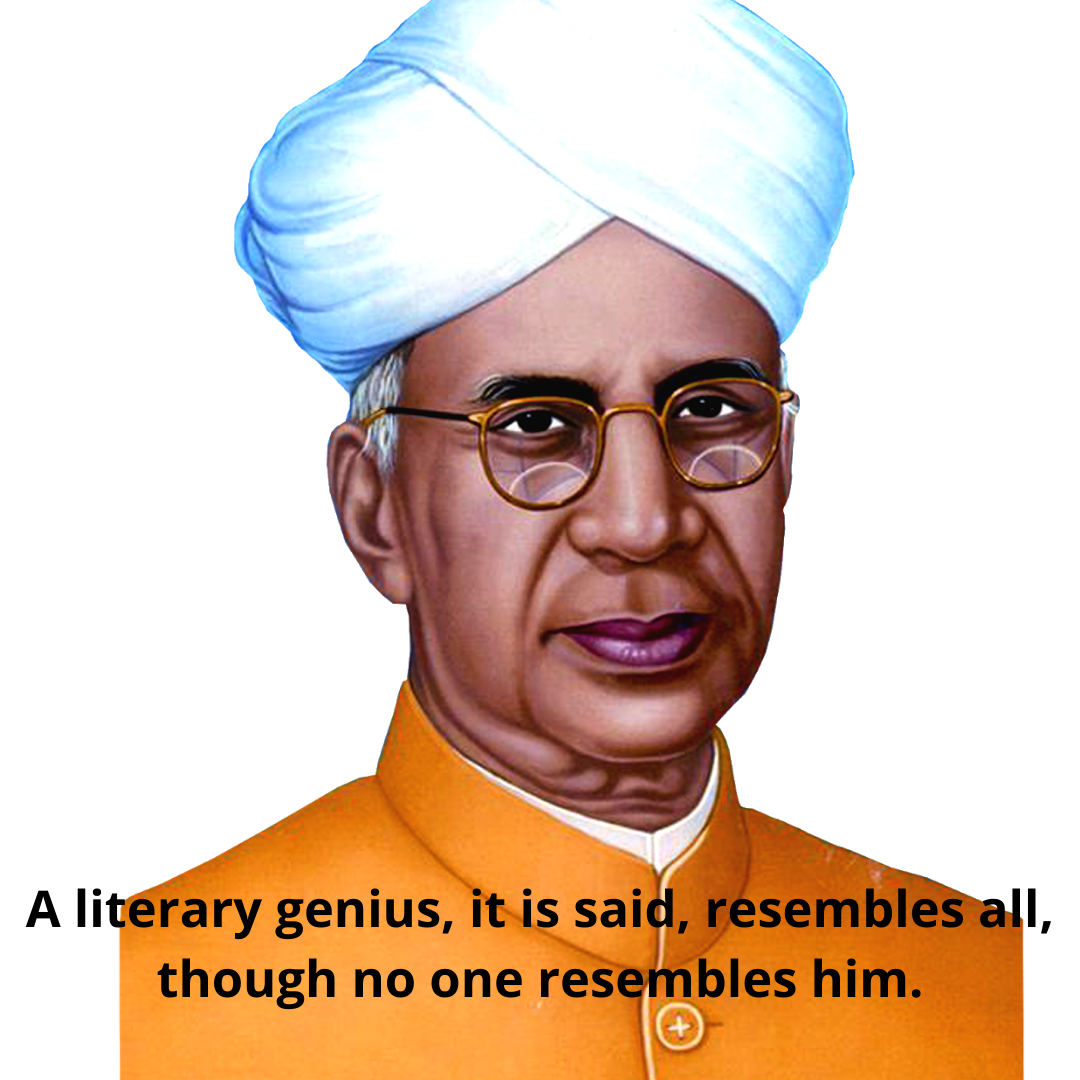
A literary genius, it is said, resembles all, though no one resembles him.
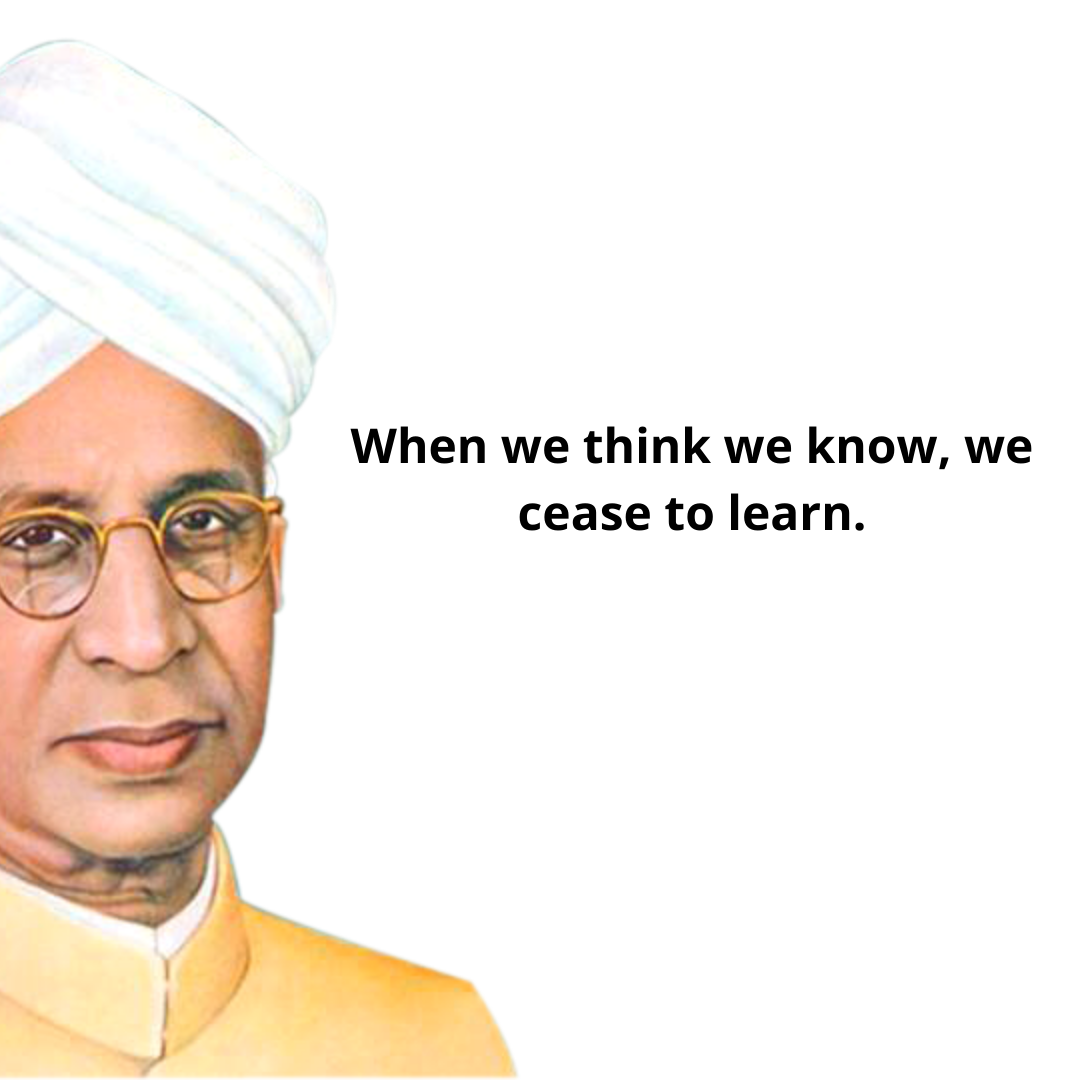
When we think we know, we cease to learn.
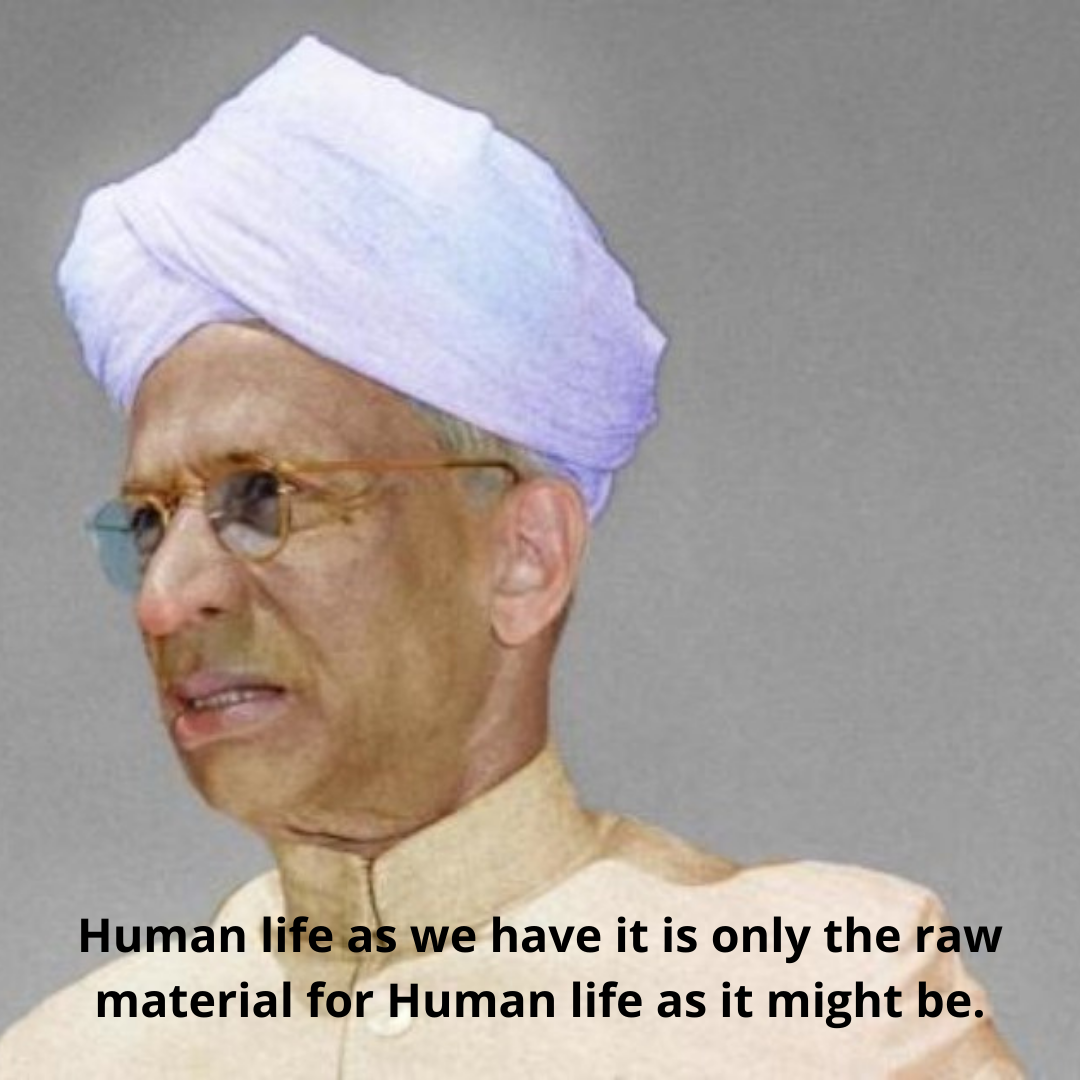
Human life as we have it is only the raw material for Human life as it might be.
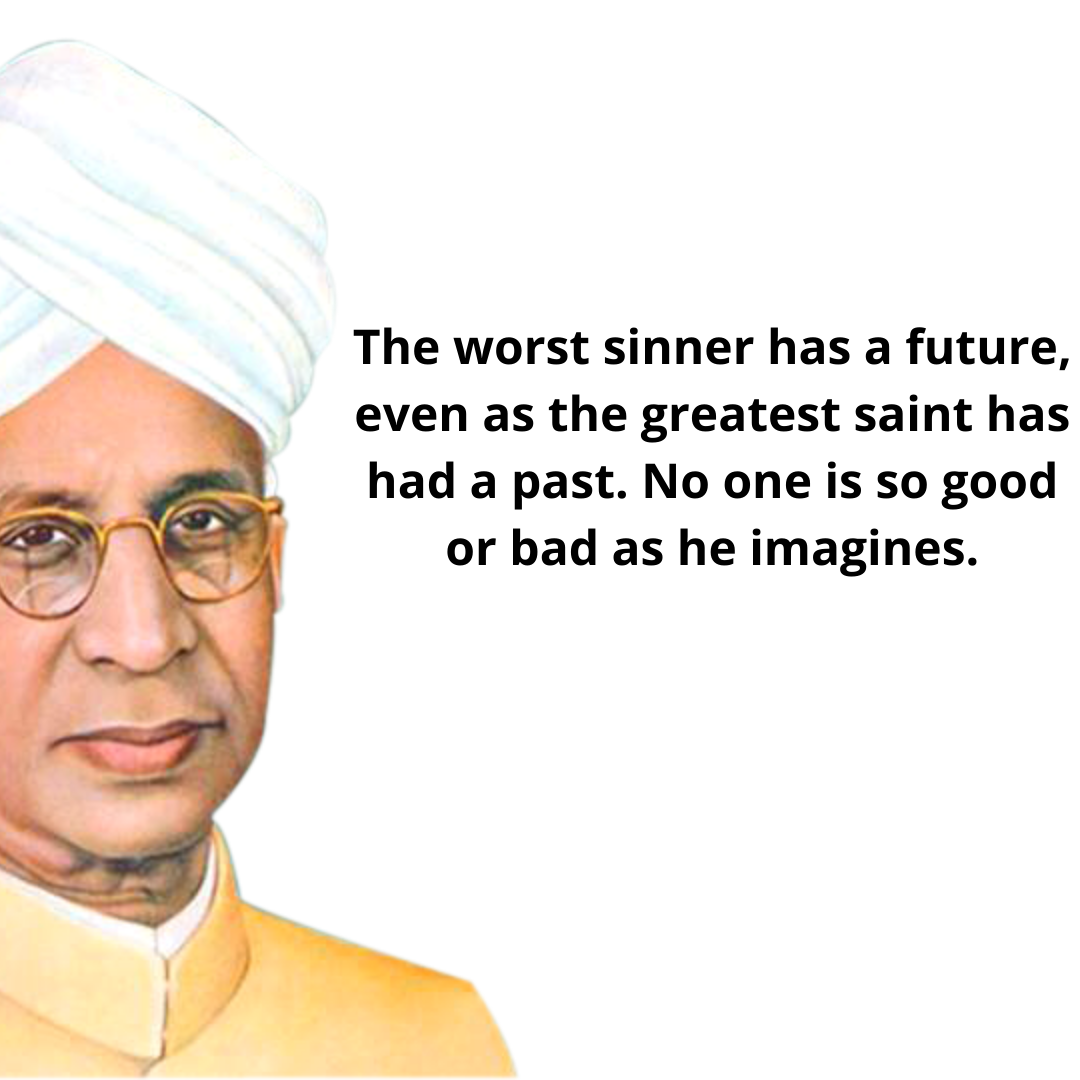
The worst sinner has a future, even as the greatest saint has had a past. No one is so good or bad as he imagines.
| Quote |
|---|
| 1. “The end-product of education should be a free creative man, who can battle against historical circumstances and adversities of nature.” |
| 2. “Books are the means by which we build bridges between cultures.” |
| 3. “True religion is a revolutionary force: it is an inveterate enemy of oppression, privilege, and injustice.” |
| 4. “The true teachers are those who help us think for ourselves.” |
| 5. “Man is a paradoxical being – the constant glory and scandal of this world.” |
| 6. “The worst sinner has a future, even as the greatest saint has had a past.” |
| 7. “Patriotism cannot be our final spiritual shelter; my refuge is humanity. I will not buy glass for the price of diamonds, and I will never allow patriotism to triumph over humanity as long as I live.” |
| 8. “It is man that makes truth great, not truth that makes man great.” |
| 9. “Those who know how to think need no teachers.” |
| 10. “Let us not think that we are at the end of history, that we have nothing more to accomplish. We stand on the threshold of conquests infinitely greater than those that are recorded in the history of the past.” |
| 11. “Knowledge gives us power, love gives us fullness.” |
| 12. “The worst sinner has a future, even as the greatest saint has had a past.” |
| 13. “A life of joy and happiness is possible only on the basis of knowledge and science.” |
| 14. “Religion is behavior and not mere belief.” |
| 15. “The ultimate goal of all literature is to know the truth and to make others know it.” |
| 16. “The theocentric and the anthropocentric views are both partial truths while the integral view does justice to the facts of religion.” |
| 17. “To be true to one’s religion requires not the sacrificing of the intelligence but the developing of it into its most critical condition.” |
| 18. “The ultimate truth must transcend the duality of subject and object.” |
| 19. “By unitive experience I mean the experience of unity of one’s self with Pure Consciousness devoid of all empirical content.” |
| 20. “The prophets of mankind have been due to men’s conviction that actual things might be carried to a higher perfection than they at present enjoy.” |
| 21. “The laws of nature represent creation’s habits rather than God’s dictates.” |
| 22. “Hinduism is more a culture than a creed.” |
| 23. “The Bhagavadgita deals essentially with the pursuit of life’s supreme good.” |
| 24. “The Vedas are the source of higher mathematics.” |
| 25. “The Bhagavad Gita and the Sermon on the Mount contain the essential truths of religion especially relevant to modern society.” |

Welcome to our blog! My name is Yuvraj Kore, and I am a blogger who has been exploring the world of blogging since 2017. It all started back in 2014 when I attended a digital marketing program at college and learned about the intriguing world of blogging.
